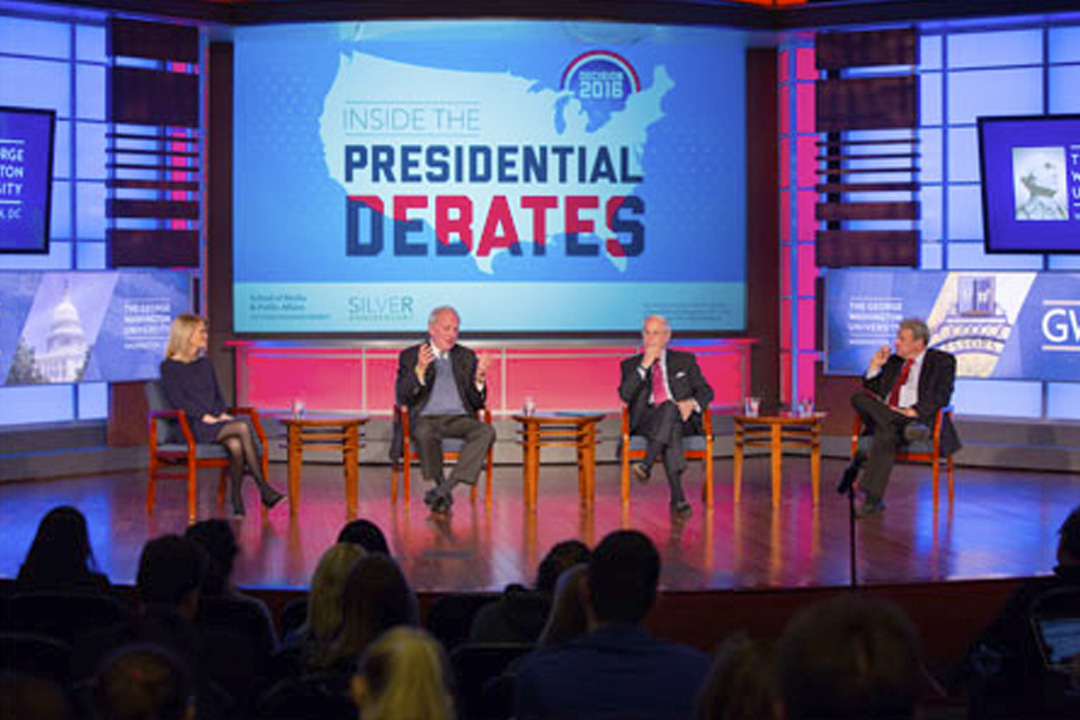By Clay Miller, MA '16
Two gladiators step into the arena, dressed in their finest armor and ready for a heated battle. The crowd waits with anticipation as they prepare for combat. But this gladiator match is not taking place inside the Roman Coliseum. It is taking place under the bright lights of the debate stage.
The gladiator matches known as Presidential debates have come to define our election cycles. On March 22nd, three of the foremost experts on these debates gathered in the Jack Morton Auditorium for the SMPA Silver Anniversary event “Decision 2016: Inside the Presidential Debates.” Over the course of the exciting evening, moderator and SMPA professor Steve Roberts led journalist Martha Raddatz, and the two chairs of the Commission on Presidential Debates, Mike McCurry and Frank Fahrenkopf, in a lively discussion about the importance of debates, new media changes, and what to expect in the upcoming cycle.
The discussion made clear the instrumental role debates have in the Presidential cycle. At the start of the conversation, Roberts asked the packed house of students “Who has watched a debate this cycle?” Every single hand in the auditorium immediately went up. But why are these debates so important? Why do we love to watch them so much? For Fahrenkopf, the Republican representative to the Commission on Presidential Debates and a former head of the RNC, the debates present an opportunity to see clear differences in personalities and positions. Raddatz, who has previously moderated the well-received 2012 Vice Presidential Debate, concurred, adding that these debates help to provide a crucial role in informing the public on the issues and where the candidates stand. For McCurry, the debates are also a test of strength and temperament. The former White House Press Secretary noted that the debates allow for unscripted moments that provide genuine insights into personality.
And in this contentious election cycle, personalities have clearly taken the wheel. Over the course of many primary debates, personal insults and accusations have flown free. But the two chairs made clear that the general election debates are very different than the network- run primary debates. They do not feature advertising or sponsors. They are focused almost exclusively on policy, the economy and other crucial issues. In the era of Trump, the chairs added that they wanted to bring an air of dignity to the proceedings. However, as Fahrenkopf noted, they could not force the candidates to act with civility. The candidates each have their time- and if they use the time to engage in insults, then that is their choice. He also stressed that he felt these events would bring out the best in these candidates because of the simple criteria that “Americans want to like their President.”
Today’s debates are faced with an ever-changing media environment. In the discussion, Fahrenkopf and McCurry made clear that they were committed to incorporating social media in the debatesFor Raddatz, using social media in debates allows her to use these new tools to find out what topics and questions the American public cares about- and to prepare accordingly. Though she made sure to note that she incubates herself from social media before the debate, she added that these insights play a crucial role in determining what to ask and discuss.
For students, this SMPA event offered another #OnlyatGW opportunity for behind-the-scenes insight into the inner workings of our political process. For Political Communication students like me, I learned more about the messaging and framing aspects of communication during Presidential elections. The panelists discussed at length how the candidates prepare their message and frame each debate as a chance to show that they are the most qualified leaders in the country. The panel explained just how crucial it was for political communicators to use media tools to best frame the debates to their advantage- and to make their performances standout in an unforgiving modern news cycle. For journalism students, this discussion offered a rare opportunity to see how journalists prepare for the most watched political news events in the country. Raddatz explained that she has complete control over the question- and made sure to emphasize that the candidates have no influence on what she will ask. This independent journalism is a shining example of reporters’ efforts to make our democracy and our free media work to the benefit of the American people.
SMPA worked to make this event possible along with co-sponsors in the College Democrats and Republicans and the Graduate School of Political Management. Overall, is provided a rare and fascinating look into one of the most intense political events. When the gladiators step into the arena in the fall of 2016 those who attended will look on as wise commentators, knowing exactly why these debates matter- and how they came to be.


